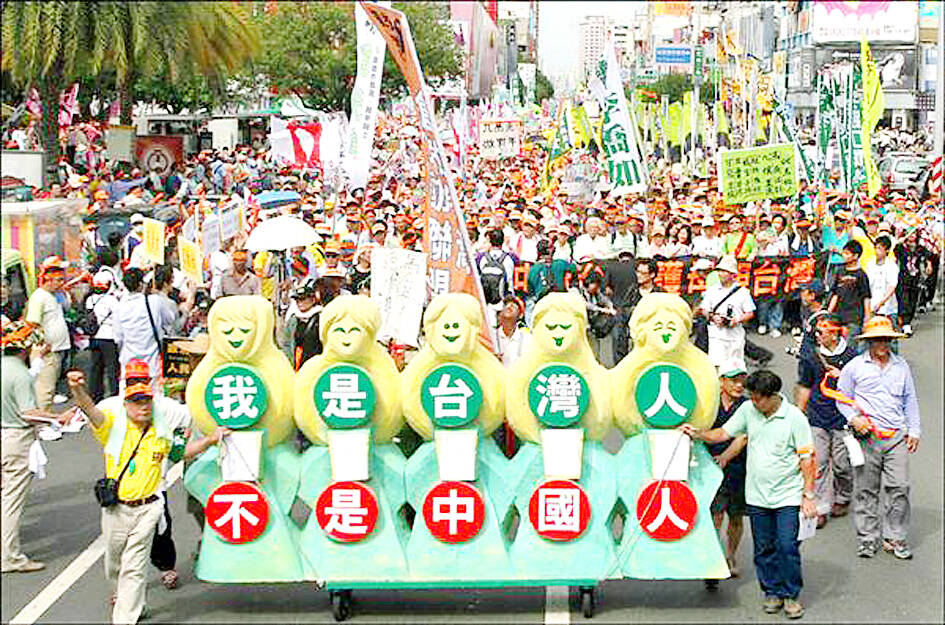The percentage of Taiwanese identifying as only Chinese reached a new low last year of 2.4 percent, the latest consolidated survey results from National Chengchi University showed on Thursday.
The figure represents the lowest percentage identifying as only Chinese since the university’s Election Study Center began the survey in 1992.
About 61.7 percent of those surveyed identified only as Taiwanese, down from 63.3 percent in 2022.

Photo: Taipei Times
Taiwanese identification in the survey has exceeded 60 percent in all of the past four years, after hitting a high of 64.3 percent in 2020.
The percentage of those identifying as only Taiwanese overtook those identifying as both Taiwanese and Chinese in 2008, and that has not changed since.
When the survey was first conducted in 1992, 25.5 percent of respondents said they identified as only Chinese, to only 17.6 percent who identified as only Taiwanese and 46.4 percent who identified as both.
By last year, the “both” identification had fallen to 32 percent.
Asked about their stance on unification and independence, 33.2 percent supported maintaining the “status quo” indefinitely, a new high since the question was first asked in the survey in 1994.
Those supporting maintaining the “status quo” indefinitely overtook those who support deciding at a later date for the first time in 2022, with only 27.9 percent now supporting deciding at a later date.
Supporters of unification “as soon as possible” only totaled 1.2 percent last year and has never exceeded 5 percent, while 6.2 percent supported maintaining the “status quo” while moving toward unification.
Only 3.8 percent said that they want independence “as soon as possible,” the lowest percentage since 2002.
The number of supporters of the “status quo” while moving toward independence continued its four-year downward trajectory to 21.5 percent last year, after hitting a high of 25.8 percent in 2020 and seeing a huge jump from 15.1 percent in 2018.
Additional reporting by CNA

A Ministry of Foreign Affairs official yesterday said that a delegation that visited China for an APEC meeting did not receive any kind of treatment that downgraded Taiwan’s sovereignty. Department of International Organizations Director-General Jonathan Sun (孫儉元) said that he and a group of ministry officials visited Shenzhen, China, to attend the APEC Informal Senior Officials’ Meeting last month. The trip went “smoothly and safely” for all Taiwanese delegates, as the Chinese side arranged the trip in accordance with long-standing practices, Sun said at the ministry’s weekly briefing. The Taiwanese group did not encounter any political suppression, he said. Sun made the remarks when

The Taiwanese passport ranked 33rd in a global listing of passports by convenience this month, rising three places from last month’s ranking, but matching its position in January last year. The Henley Passport Index, an international ranking of passports by the number of designations its holder can travel to without a visa, showed that the Taiwan passport enables holders to travel to 139 countries and territories without a visa. Singapore’s passport was ranked the most powerful with visa-free access to 192 destinations out of 227, according to the index published on Tuesday by UK-based migration investment consultancy firm Henley and Partners. Japan’s and

BROAD AGREEMENT: The two are nearing a trade deal to reduce Taiwan’s tariff to 15% and a commitment for TSMC to build five more fabs, a ‘New York Times’ report said Taiwan and the US have reached a broad consensus on a trade deal, the Executive Yuan’s Office of Trade Negotiations said yesterday, after a report said that Washington is set to reduce Taiwan’s tariff rate to 15 percent. The New York Times on Monday reported that the two nations are nearing a trade deal to reduce Taiwan’s tariff rate to 15 percent and commit Taiwan Semiconductor Manufacturing Co (TSMC, 台積電) to building at least five more facilities in the US. “The agreement, which has been under negotiation for months, is being legally scrubbed and could be announced this month,” the paper said,

MIXED SOURCING: While Taiwan is expanding domestic production, it also sources munitions overseas, as some, like M855 rounds, are cheaper than locally made ones Taiwan and the US plan to jointly produce 155mm artillery shells, as the munition is in high demand due to the Ukraine-Russia war and should be useful in Taiwan’s self-defense, Armaments Bureau Director-General Lieutenant General Lin Wen-hsiang (林文祥) told lawmakers in Taipei yesterday. Lin was responding to questions about Taiwan’s partnership with allies in producing munitions at a meeting of the legislature’s Foreign Affairs and National Defense Committee. Given the intense demand for 155mm artillery shells in Ukraine’s defense against the Russian invasion, and in light of Taiwan’s own defensive needs, Taipei and Washington plan to jointly produce 155mm shells, said Lin,